
FEATURES
The CEO of Telegram, Pavel Durov is offering free In Vitro Fertilisation (IVF) treatments to women willing to use his sp3rm.
His offer is an effort to help women struggling with infertility.
Apart from offering sp3rm, Durov would also be paying for all IVF procedures through his partnership with the Altravita fertility clinic.
“We are happy to offer you a unique opportunity! Only in our clinic can you undergo IVF for free, using Pavel Durov's sp3rm-one of the most famous and successful entrepreneurs of our time,” a message on Altravita's website reads.
The clinic has pledged to offer top-tier care, working with some of the leading specialists in reproductive health and using state-of-the-art technology to ensure the best possible outcomes.
The process for women wishing to participate is simple but selective. Interested individuals can reach out to Altravita to schedule an initial consultation.
Earlier, in a post on Telegram, the CEO disclosed he fathered “over 100 biological kids” over 15 years.
“I was just told that I have over 100 biological kids. How is this possible for a guy who has never been married and prefers to live alone?” he wrote.
He recounted the story of how a friend first approached him for a sp3rm donation 15 years ago.
“He said that he and his wife couldn't have kids due to a fertility issue and asked me to donate sp3rm at a clinic for them to have a baby,” said Pavel, adding that though he initially laughed it off, he realised later that his friend was serious.
Eventually, he agreed, setting in motion a series of donations that would go on to impact many families.
He wrote, “Fast forward to 2024, my past donating activity has helped over a hundred couples in 12 countries to have kids. Moreover, many years after I stopped being a donor, at least one IVF clinic still has my frozen sp3rm available for anonymous use by families who want to have kids.”
“The shortage of healthy sp3rm has become an increasingly serious issue worldwide, and I'm proud that I did my part to help alleviate it,” Durov added.
Popular Nigerian singer, Charles Chukwuemeka Oputa, aka Charly Boy, has opened up on how he was s3xually abused by his nanny.
He also revealed that at the age of 12, he contracted gonorrhoea.
Speaking during a recent discussion media chat with Duke Rants, Charly Boy opened up on various subjects, including erectile dysfunction, emphasizing that s3xual intimacy encompasses more than mere p3netration.
The renowned entertainer shared that he has experienced a multitude of s3xual adventures, recounting the incident of being r@ped by his nanny and describing it as a pleasurable experience.
“I was r@ped by my nanny,” Charly Boy noted.
When asked how it felt like to be abused at such age, Charly Boy said he enjoyed being r@ped by his Nanny despite not knowing what it was at the time.
“No, I didn’t. I actually enjoyed it. I didn’t know what was going on but it felt good,” he said.
Speaking further, Charly Boy said that he had already contracted gonorrhoea at age 12 as he frequented the brothels around.
“At 12, I’d already contracted gonorrhoea. I was going to all the brothels around, you know,” he shared.
Popular Nigerian crossdresser, Bobrisky has hinted at never returning to the country.
The socialite left Nigeria on November 11 after his faceoff with the EFCC and Immigration officers.
He shared photos on his IG page yesterday and someone asked him to to return to Nigeria as he is being missed.
See Bobrisky's response below;
Nyesom Wike, the Minister of the Federal Capital Territory (FCT), has said that all the work he has been doing in Abuja is part of good governance and a manifestation of President Bola Tinubu’s renewed hope agenda.
Wike stated this during the inspection of the ongoing construction of the five-kilometre Saburi – Dei Dei road in Abuja.
According to him, Tinubu’s promise to satisfy Nigerians is being fulfilled through good works that would renew the hope of citizens.
Wike said, “Good governance is inclusive of the provision of basic infrastructure, being transparent and accountable, providing security and providing quality health and education to the people.
“All the things that we have been doing in FCT are part of good governance.”
The minister expressed joy that the people were happy with what he was doing in FCT to transform their lives.
“We are happy that the people appreciate what we are doing. This is very important to us that the people are happy,” he added.

Households have expressed pessimism over the rising costs of living in the country, and have projected that costs of transportation, house purchase, purchase of car/vehicle, rents and medical expenses will experience an increase over the next six months.
According to the newly released ‘Households Expectation Survey’ by the Central Bank of Nigeria, consumers said they will spend their incomes only on basic items such as food and other household items, education, transportation, electricity and medical expenses.
The CBN’s overall Consumer Confidence Index and outlook is attributed to the outlook of consumers on three key dimensions: Economic Conditions, Family Financial Situation, and Family Income.
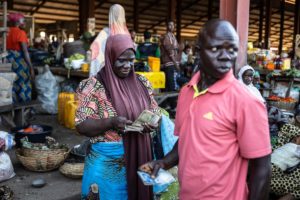
CBN said, “More consumers believe that the cost of transportation, house purchase, purchase of car/vehicle, rents and medical expenses will experience increase over the next six months in the following order.
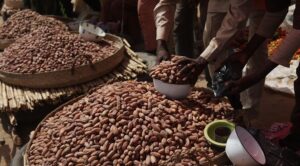
“Households anticipate spending their income on basic expenditure items like Food & Other household items, Education, Transportation, Electricity and Medical Expenses across all time periods reviewed.
“However, they do not intend to spend a substantial portion of their income on items like purchase of House, Car/vehicle for the period under review.”
The survey also indicated that households do not intend to spend their earnings on the purchase of motor vehicles and buildings & landed properties within the months under review.
“The Buying Condition Index1 for big-ticket items like Consumer Durables, Motor Vehicles and Buildings & Landed Properties, indicated that most respondents consider the current month unfavourable for purchasing these items. Consumers also do not think that the next three and six months are ideal periods to buy these items.”
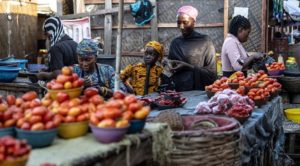
The CBN’s survey rides on the back of a similar report by AFP, that the country’s economic crisis and soaring petrol prices have forced many Nigerians to public transportation over the use of their cars.
A case study was made of Bolaji Emmanuel who gave up his driver and his Honda Pilot utility vehicle due to spiking living costs.
The price of petrol has risen more than fivefold since President Bola Tinubu took office in May 2023.
“I parked it at my son’s house. I use public transport now,” Emmanuel, a 72-year-old retired health worker, told AFP. “It is not convenient, but it is what the economy demands.”
Since coming to power, Tinubu has ended a costly fuel subsidy and freed up the naira currency, in reforms that government officials and analysts say will revive the economy and attract investors.
But in the short term, Nigeria has seen one of its worst crises in decades with inflation at a three-decade high.
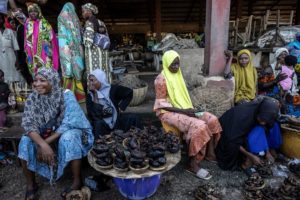
A litre of petrol sold for around 195 naira just before Tinubu took office. The price rose to at least 998 naira ($0.61) per litre in Lagos and 1,030 naira in the capital, Abuja, at the beginning of October. It can go for as much as 1,300 naira elsewhere.
Inflation reached an almost three-decade high of 34.19 per cent in June. It has since slowed to 32.7 per cent in September and October.
The slump in purchasing power is piling more hardship on locals, with more than 40 per cent of the population living in poverty, according to the World Bank. That figure is expected to rise in 2024 and 2025, before it stabilises in 2026.
Car dealers in Lagos and Abuja told AFP that they had seen more and more people trading their fuel-guzzling cars and sports utility vehicles (SUVs) for more efficient vehicles to cut costs.
“People are actually selling their big cars these days,” Maji Abubakar, a car dealer in Abuja, told AFP. “The problem is that even if you put them on the market, there isn’t much demand for them.”
“It has been more than a year since I sold a car with an eight-cylinder engine, and the major reason is the price of petrol,” he added.
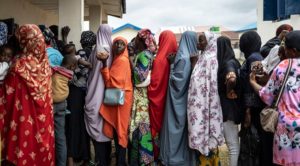
The market for new cars has dropped by 10 to 14 per cent in the last year, according Kunle Jaiyesinmi, deputy director at the Lagos-based CFAO Group, which specialises in automobile distribution.
“An SUV that sold for 40 to 45 million naira ($24,000 to $27,000) about two years ago, for now, if you want to negotiate the price, you see that it is within the range of 95 or 100 million ($57,000 to $60,000),” Jaiyesinmi told AFP.
More...
The Kano State Debt Management Office has said that it serviced N63.5 billion in both foreign and domestic debts incurred during the administration of the immediate past governor, Abdullahi Umar Ganduje.
Dr. Hamisu Sadi Ali, Director General of the Kano State Debt Management Office, made this disclosure while addressing the media on the state’s debt profile.
Dr. Ali noted that the current administration, under Governor Abba Kabir Yusuf, has not incurred any new debt since coming into office on May 29, 2023.
"Since the inception of Alhaji Abba Kabir Yusuf’s NNPP administration from 29th May 2023 to date, no single penny was signed, contracted or received by the Kano State Government within or outside the country as a loan,” he affirmed.
In an effort to reduce Kano’s debt burden, the current government has paid N3.49 billion in external debt and N60 billion in domestic debt, totalling N63.5 billion for the first and second quarters of 2024. With these payments, the state’s total outstanding debt has been reduced to N127.8 billion.
Dr. Ali highlighted that the Kano State Public Debt Management Law 2021 mandates that the Debt Management Office manages all borrowing on behalf of the state government. He added that former Governor Ganduje’s administration had signed multiple international and domestic loan agreements, including a 64 million euro agreement with the French Development Agency in July 2018 for the Third National Urban Water Sector Reform Project.
The debt portfolio includes projects funded by foreign loans, such as the Multi-state Road Project, Malaria Control Booster Project, and the Third National Fadama Project. Dr. Ali clarified that, historically, Kano State had not borrowed from any domestic lenders, including commercial banks, until Ganduje’s administration, which obtained six different loans from various banks, such as a N10 billion Infrastructure Loan from Access Bank and a N20 billion Salary Bail-out from Fidelity Bank.
With this substantial debt repayment, the current administration aims to reduce Kano’s financial burden and improve the state’s economic outlook.
The Independent Petroleum Marketers Association of Nigeria (IPMAN) has announced a planned reduction of ₦50 per litre in the price of Premium Motor Spirit (Petrol) for consumers.
This development follows a new agreement between IPMAN and Dangote Refinery, as confirmed by IPMAN’s National President, Abubakar Maigandi, during an interview with Channels Television on Tuesday.
Maigandi, while speaking on Channels TV, disclosed that Dangote Refinery has set a price template of ₦940 per litre for depot purchases and ₦990 per litre for truck purchases for IPMAN members, a move expected to bring down petrol prices across the country.
The Nigerian military has identified Lakurawa as a relatively new terror group infiltrating Sokoto and Kebbi states via the Niger Republic after the recent coup in Nigeria’s neighboring country.
However, investigations by Premium Times reveal that Lakurawa, an al-Qaeda-linked organization, has been active since before last year’s Niger coup.
Last week Thursday, the Nigerian Defence Headquarters acknowledged Lakurawa as a fresh threat worsening insecurity in the North-west.
“Troops are confronted with a new terrorist sect in the North-west,” said Edward Buba, a military spokesperson, at a press briefing. “This sect is known as Lukawaras, the Lukawaras are affiliated to terrorists in the Sahel, particularly from Mali and Niger Republic.”
Buba, a major general, also claimed that Lakurawa emerged from Mali and Niger following the breakdown of military cooperation between Niger and Nigeria after last year’s coup.
Following the military’s recent classification of Lakurawa as a new threat, multiple narratives have emerged on social media about the group. While some link them to the Islamic State in the Greater Sahel (ISGS), past research contradicts this affiliation.
A 2022 study by Murtala Rufa’i, James Barnett, and Abdulaziz Abdulaziz notes that Lakurawa militants reject the Boko Haram label, preferring terms like Mujahideen or Ansaru—associating them with al-Qaeda in the Islamic Maghreb (AQIM) in Nigeria.















